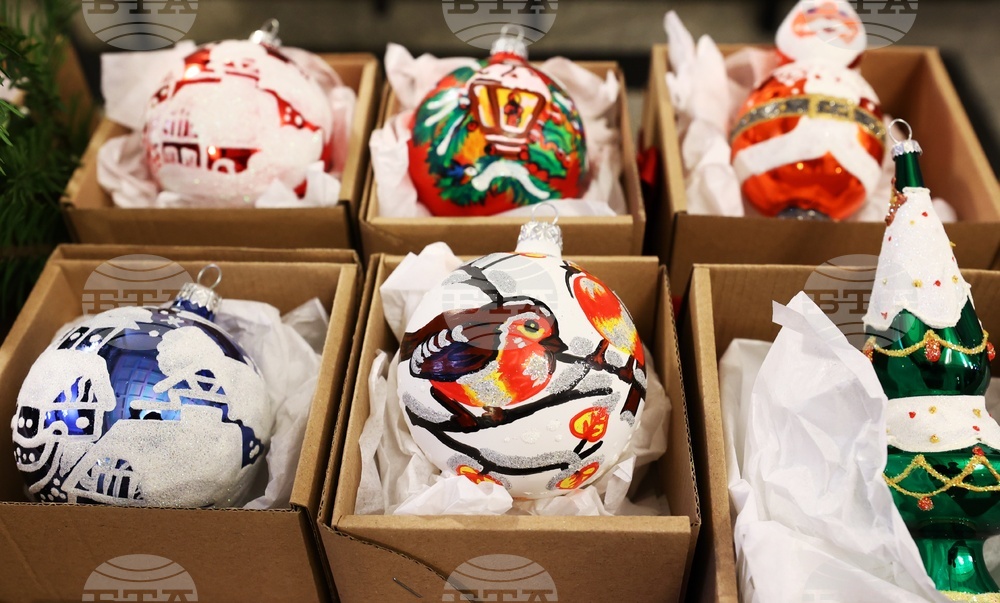site.btaBulgarian Social Enterprises Present Gifts with Cause: Glass and Wool Christmas Toys, Candles, Ancient Games and More


Bulgarian Biodiversity Foundation (BBF) Executive Bureau member Rumyana Ivanova and Social Enterprise for People with Disabilities - Plovdiv (SEPD - Plovdiv) Director Vanina Kostadinova gave BTA an interview on what product with a cause are and why people should prefer such gifts for the holidays. BBF is one of the organizations that created a store for products of social enterprises in Sofia.
Christmas tree toys made of glass or wool, textile and ceramic products, candles, even ancient games made of leather are some of the products handmade by people with special needs in social enterprises in the country. It is important for people to know that social enterprises exist and when they decide to buy a Christmas present, why not choose their products, they are not inferior, they are wonderful and quite clearly support a cause, Ivanova said. She added that the strength of social enterprises is that the work makes people meaningful, because with through it they can make someone happy and get money.
Kostadinova said providing work gives people with disabilities hope for a normal life and a sense that they can earn their own living and no longer stay at home. She pointed out that before they started working in the social enterprise, some of these people had stayed at home for 20 years without any social contacts, and now they feel happy and content and look at life in a completely different way.
"I have been working for five years and managed to build with my colleagues from Plovdiv Municipality a functioning social enterprise that does real work for the Municipality and has enviable revenues," said Vanina Kostadinova. The enterprise has three studios in Plovdiv (South Bulgaria), where textile and ceramic products and hand-painted glass Christmas tree toys are made. "We employ 27 people, 80% of whom are people with special needs, reduced working capacity and TEMC," she said.
One studio makes glass toys year-round. Colleagues in Poland and Germany make so-called mould toys, which is much easier, while here everything is done entirely by hand. The glass is heated on gas burners to 800C, then the person blowing them has no more than ten seconds to give them their shape, which is extremely difficult, Kostadinova said.
The other workshop is related to the manufacture of textile products, in which all the flags of the Plovdiv Municipality are sewn, as well as bedding for hospitals, kindergartens and all kinds of institutions on the territory of the municipality. In the third atelier, souvenirs are made, which are mainly Plovdiv-themed and are sold in tourist information centres, in the social enterprise's shop and in various places in the city, Kostadinova explained.
Ivanova noted that the products of the social enterprises can now be found not only in craft bazaars but also in a shop in the centre of Sofia. "The reason we made Shtrak [the name of the shop] was to have a physical store where social enterprises can sell their products," she explained. "We brought together a variety of social enterprises with their causes - some are for people with intellectual disabilities, others are environmental, others are for mothers of disabled children who cannot work," Ivanova said. "What we do is to participate in the Christmas bazaars and suggest to companies that instead of buying Chinese notebooks for Christmas presents, they should support a social enterprise and a person with a need," she explained. Everything that happens in the store supports someone's cause, even drinking coffee there or renting the event hall, Ivanova added.
She pointed out that all the products they offer are handmade and gave the example of ancient games that existed in Bulgarian lands, which the social enterprise researches, makes them out of leather and uses the money from these products to support talented children. In another social enterprise, people with mental illness make linen and textile towels. "They're fantastic tailors, but when you go on the job market and say you're in schizophrenia remission, no one will ever hire you, and these people do phenomenal things," Ivanova stressed. She said that one of the social enterprises makes Christmas balls and toys out of wool, and the social enterprise JAMBA helps people with disabilities learn useful skills, such as making candles. She also noted that SOS Children's Villages make fantastic ceramics, second to nothing that can be found on the market.
Companies are quite clearly starting to choose such gifts with a cause for the holidays, Ivanova added. "At Christmas we do these corporate commissions where companies approach us and ask us to put together a Christmas box for their employees. We combine products from different social enterprises and companies increasingly prefer them," she said.
Kostadinova stressed that in order for companies to have a financial incentive to support social enterprises or to create their own, it is necessary to have legislative changes. "Personally, as someone with experience, I think it is best for social enterprises to be built by specialists who know how to support people with different needs," she said, pointing out that the Plovdiv enterprise also employs social workers and psychologists. "It is best to create conditions for these enterprises to operate, and to give large and medium-sized companies the opportunity to support them, for example by reducing taxes," Kostadinova said.
She noted that the protection of people with disabilities from dismissal hinders employers from hiring them. She said legislative changes are needed to make it easier for people with special needs to find jobs and for employers not to worry about hiring them.
/MR/
news.modal.header
news.modal.text